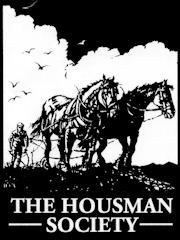A Shropshire Lad
|
|||||||||||||||||||||||||||||||||||||||||||||||||||||||||||||||||||||||||||||||
Key: V: Textual Variation. C: Commentary. Q: Question. Glossary
ASL XVII “Twice a week the winter thorough”
Top ▲ Glossary
| Line | Word | Glossary |
| 1 | thorough | Archaic form of ‘through’ |
Top ▲ Commentary
| Line | Commentary |
| Date: May – July 1895 | |
| In a letter dated 15 February 1905, Housman stated his objection to the inclusion of this poem in an anthology, The Athlete’s Garland (1905), explaining that it, “merely mentions football and cricket as palliations of misery” and thus contains, “mere casual allusions to athletics” Letters, 77 | |
| 7 | “son of grief” suggests two biblical references, Genesis 35:18: “she (Rachel) called his name Ben-oni (That is, “son of my grief”) and Isaiah 53: 3: “a man of sorrows”. In the first reference, Rachel dies giving birth to her son, later named Benjamin. |
| 9 | The three monosyllabic words at the beginning of the line, followed by the caesura, give a sense of determination as the third stanza begins |
| Metre | Four line stanzas, with alternating rhymes. The first and third lines have eight syllables (iambic quatrameter) but the other lines are shorter, seven and then five syllables. |
Top ▲ Variations
| Line | Text | Textual variation |
| 2 | d1 | I bestrode \ besieged / the guarded \ threatened / \ trampled / goal: → I bestrode the trampled goal \ Wet or dry, \ Afternoons / I kept the goal / \ I stood guardian at \ guard before / the goal / |
| 2 | d2 | <Mud or frost, > \ Here in field \ I stood \ stood I / to keep / / I kept the goal: |
| 3 | then was fighting] <then was warring>> \ made the fight with / | |
| 7 | son of grief] son<s> of <men> man \ <Eve> grief | |
| 9 | Try I will] <Try, my lads> |
Top ▲ Questions
| Line | Question |
| 2 | In the drafts, the goal is described as ‘guarded’, ‘threatened’ and trampled’ and the narrator ‘bestrode’, ‘besieged’, then ‘stood guardian’ ‘at guard’. Yet in the final version he simply ‘kept the goal’ What is the effect of removing these earlier words? |
| 4 | What effect does the shorter final line of each stanza have on the mood of the poem |
| 8 | In what ways do football and cricket act to reduce the misery of life felt by the narrator? |
| 9 | What is the effect of changing “Try, my lads” in the draft of the poem to “Try I will” in the final version? |
| 10-12 | Do you find the ending of the poem has a positive or negative tone and message? |
